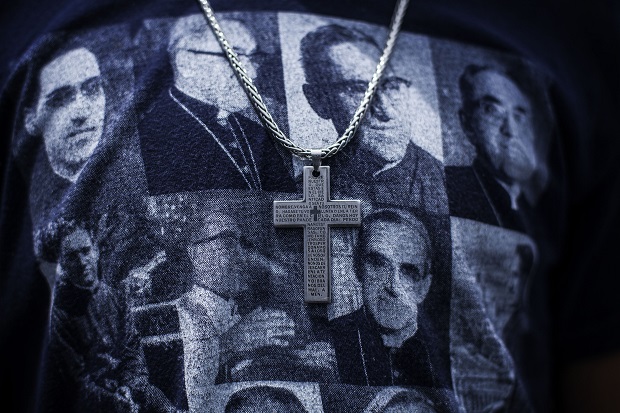Slain Archbishop Romero beatified, Salvadorans rejoice

A solar halo appears during the beatification ceremony for Roman Catholic Archbishop Oscar Romero in San Salvador, El Salvador, Saturday, May 23, 2015. The solar halo is an optical phenomenon produced when sunlight refracts through ice crystals in the atmosphere. AP
SAN SALVADOR, El Salvador — Archbishop Oscar Romero was beatified by Roman Catholic officials Saturday in an emotional ceremony elevating the once-controversial cleric to the ranks of the blessed 35 years after his assassination.

A man wears a cross and a T-shirt featuring portraits of Catholic Archbishop Oscar Romero during his beatification ceremony in San Salvador, El Salvador, Saturday, May 23, 2015. Romero was slain by an assassin’s bullet 35 years ago and declared a martyr for his faith this year by Pope Francis. In life, Romero was loved by the poor, whom he defended passionately, and loathed by conservatives who considered him too close to left-leaning movements in the tumultuous years ahead of El Salvador’s 1980-92 civil war. AP
Underneath a rainbow halo ringing the sun, Cardinal Angelo Amato, the prefect of the Vatican’s saint-making office, called on the crowd of some 260,000-plus to rejoice in a “feast of peace, fraternity and forgiveness.”
BACKSTORY: Pope eyes fast sainthood for El Salvador’s Archbishop Romero
“Romero’s spirit remains alive and gives comfort to the marginalized people of the world,” Cardinal Amato said. “His preference for the poor was not ideological, but evangelical. His charity extended to his persecutors.”
Beatification is the first step toward possible canonization, although many of those who packed the Salvadoran capital’s Savior of the World Plaza and the surrounding streets already credit Romero with miracles and refer to him as “Saint Romero of the Americas.
Worshippers from across the nation, many of them bused in from the countryside, held up poster-size images of Romero and carried white and yellow flags of the Vatican.
“They can kill the prophet, but not the voice of justice,” intoned pilgrims from the Our Lady of the Assumption parish in a San Salvador suburb.
“His words will remain for eternity,” said Marlene Sanchez, 26.
BACKSTORY: Pope decrees slain Salvadoran Archbishop Romero a martyr
In life, Romero was loved by the poor, whom he defended passionately, and loathed by conservatives who considered him too close to left-leaning movements in the tumultuous years ahead of El Salvador’s 1980-92 civil war.
The archbishop was shot through the heart by a sniper while celebrating Mass in a cancer hospital chapel on March 24, 1980. The day before, he had delivered a strongly worded admonition to the U.S.-backed military to stop abusing civilians. Those words were read aloud Saturday: “I beg you, I beseech you, I order you, in the name of God, cease the repression.”
The trigger man has never been identified, and no one has been prosecuted for the killing. Alleged paramilitary death squad leader Roberto d’Aubuisson, who was named by a U.N. truth commission after the war’s end as the mastermind of the assassination, died in 1992 having maintained his innocence to the end.
No to liberation theology
Romero’s beatification was held up for years by church politics until then-Pope Benedict XVI “unblocked” the case in late 2012, after it was determined he had not been an adherent of revolutionary liberation theology as many claimed. Earlier this year, Pope Francis declared that Romero was martyred out of hatred of his faith, clearing the way for beatification.
Although Romero still has critics in El Salvador and the church, Saturday’s ceremony constitutes official approval of his legacy. Representatives of the conservative Arena political party founded by d’Aubuisson were in attendance, as was his son, an Arena congressman also named Roberto.
“The beatification … is a cause for great joy for Salvadorans and for those of us who rejoice at the example of the greatest children of the church,” Francis said in a statement. “Monsignor Romero, who built peace from the strength of love, gave testimony of the faith with his life, committed to the very end.”
U.S. President Barack Obama, who visited Romero’s tomb in 2011, called him “an inspiration for people in El Salvador and across the Americas.”
“He was a wise pastor and a courageous man who persevered in the face of opposition from extremes on both sides,” Obama said. “He fearlessly confronted the evils he saw, guided by the needs of his beloved pueblo, the poor and oppressed people of El Salvador.”
At the sun-kissed square in west-central San Salvador, officials presented relics associated with Romero including the shirt he wore the day of his assassination. Many observers admired the appearance of the solar halo, an optical phenomenon produced when sunlight refracts through ice crystals in the atmosphere.
Officials closed off about 2 square miles (5 square kilometers) of streets nearby to accommodate the crush of pilgrims.
Among the crowd were many young people who only learned about Romero through the stories of their parents, grandparents and church officials.
“He influenced pastoral work to put itself at the service of the people,” said 24-year-old seminarian Carlos Zavala. “I’m incredibly excited.”
Celebrations were planned in Los Angeles, which is home to about 360,000 people of Salvadoran origin. Many of them arrived in the 1980s fleeing the Central American nation’s civil war, in which at least 75,000 people died and 12,000 more disappeared.
Also Saturday, tens of thousands of people gathered in the central Kenyan town of Nyeri to attend the beatification ceremony of Sister Irene Stefani, an Italian nun who worked for many years in the East African nation.
Stefani, who belonged to the Consolata Missionary Sisters, first came to Kenya in 1915 and died there in 1930 at the age of 39, according to a website dedicated to her beatification.
In her case, beatification comes after official verification of a 1989 miracle in Mozambique — a country Stefani never visited — that was attributed to her.
The miracle reportedly happened when a group of about 270 people in danger of death prayed to Sister Irene “and the little water in the baptismal font, measuring between four and six liters, was multiplied to enable them to drink and wash for four days, before help arrived from outside,” Kenya’s Daily Nation newspaper reported, citing a priest in charge of Nairobi’s Consolata Shrine.














